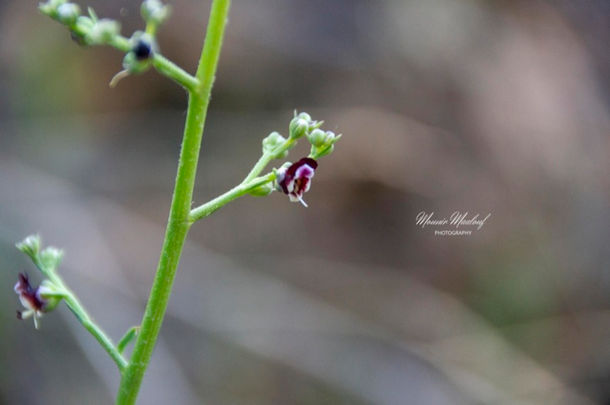Family |
Scrophulariaceae
Scrophularia xanthoglossa
Boiss.
Scrophularia xanthoglossa Boiss.
(Diagn. Pl. Orient. 12: 38; 1853 – Nouvelle Flore du Liban et de la Syrie, vol. 3, Pl. CCCLXV nº 4; 1983)
• Life-form & habit: Perennial herb with a woody base, 40–100 cm tall, often forming loose tufts. Stems erect, angular, finely striate, and glabrous or slightly glandular in the upper part.
• Leaves: Opposite, ovate-lanceolate to elliptic, 5–12 × 2–5 cm; margin coarsely serrate or crenate; base attenuate to subcordate; petioles 1–3 cm long. Surfaces green, glabrous or sparsely pubescent beneath along veins.
• Inflorescence & flowers: Terminal and axillary, paniculate or racemose, composed of numerous small, shortly pedicellate flowers on glandular peduncles. Calyx 5-lobed, greenish, broadly ovate. Corolla tubular-campanulate, 5–7 mm long, brownish to purplish with a conspicuous yellow upper lip (hence the epithet xanthoglossa, meaning “yellow-tongued”). Stamens 4 fertile plus 1 staminode. Ovary superior, 2-locular, style slender.
• Fruit: Capsule ovoid, 5–6 mm, enclosed within the persistent calyx; seeds numerous, minute, brown, reticulate.
• Phenology: Flowers and fruits from April to June.
• Habitat & elevation: Dry hillsides, rocky slopes, open shrublands, and steppe margins; typically on limestone or basaltic soils between 300 and 1 600 m.
• Lebanese distribution: Recorded by Mouterde in the Beqaa and Anti-Lebanon regions — notably between Chtaura, Ras Baalbeck, and the slopes of Jabal el-Arab; also along the Hermon foothills.
• Native range: Egypt, Iran, Kazakhstan, Kirgizstan, Lebanon–Syria, Palestine, Sinai, Turkmenistan, Türkiye, Uzbekistan (POWO).
• ⚠️ Taxonomic note: A well-defined species of the Scrophularia deserti complex, distinct by its smaller flowers and yellow-tipped corolla. Occasionally misidentified as S. deserti Delile or S. canina L. in Levantine collections; molecular data support its independent status.






